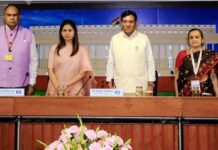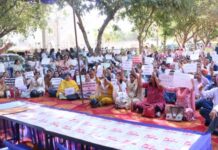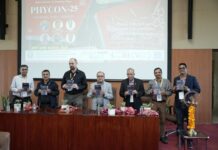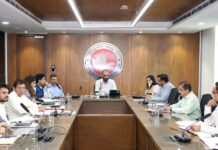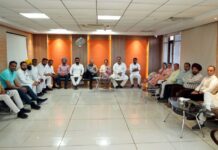PGIMER Inaugurates New Academic Session with Emphasis on Ethical Values & Compassion in Patient Care
“The art of patient handling and communication is critical, as our patients deserve not only our expertise but also our empathy, ” : Dr. Digambar Behera, Prof. Emeritus, PGIMER & President, NAMS, New Delhi
“The art of patient handling and communication is critical, as our patients deserve not only our expertise but also our empathy. The most effective treatments often stem from a compassionate interaction, not just from a clinical assessment,” underpinned Dr. Digambar Behera, Professor Emeritus, PGIMER, Chandigarh, & President, National Academy of Medical Sciences (NAMS), New Delhi, while addressing as the Chief Guest at the inspiring inaugural ceremony of New Academic Session of PGIMER today.
The event was attended by an array of notable figures including former directors, deans, senior faculty , such as Prof. Y.K. Chawla, Prof. Jagat Ram, and Prof. Subhash Verma, alongside key functionaries like Sh. Pankaj Rai, Deputy Director (Administration), Prof. Vipin Koushal, Medical Superintendent and heads of departments. Faculty members, newly inducted resident doctors, nursing officers, and other members of the PGIMER community contributed to a vibrant atmosphere of camaraderie and shared purpose.
Sharing his insights with the audience on the topic “Medicine: Past, Present & Future – Evolution Through the Ages,” Dr. Behera stressed the importance of ethical practice and empathy in the medical profession, two essential pillars that are increasingly vital as healthcare becomes more complex, the sentiment underscoring the core message of the inauguration: the need for healthcare providers to focus on the humanity in medicine.
While addressing, Dr. Behera drew from his 47 years of experience at PGIMER, sharing anecdotes that captivated the audience. He elaborated on the ethical dimensions of medical education, stating, “Medical education encompasses more than just acquiring technical knowledge; it must also instil the ethical foundations of our profession. As you encounter complex scenarios, always strive to bring a sense of humanity into your practice.” This call to action resonated throughout the auditorium, encouraging the young practitioners to embody these principles in their daily interactions with patients.
Highlighting the institute’s commitment to serving all sections of society, Dr. Behera declared, “We need to innovate how to deliver the best services within our financial constraints to innumerable poor patients who need care. Our service delivery should be without consideration of caste, creed, or color. The institute has always maintained this philosophy.”
Dr. Behera also expressed a critical concern regarding the current trends in healthcare, where patient interactions often become dehumanized as he stated, “What we have observed over the years is that patient dealing is a great casualty in our day-to-day practice that lands us in trouble many times. Our young doctors are the first point of care, so they need to know the art of patient handling from the very outset.” He emphasized that the integration of ethics and professionalism is paramount, noting that some of these issues are now part of the National Medical Council curriculum, although he suggested that more could be done.
Dr. Behera concluded his address with a powerful message about the future of medicine in an increasingly technological world. He stated, “AI should be a partner, not a replacement. Medicine is a bridge between science and humanity. By combining knowledge, technology, and empathy, we can save the future of healthcare.” He encouraged the new medical residents to embrace their unique role in this rapidly evolving landscape, saying, “The torch of innovation and compassion is in your hands.”
Earlier at the outset, Prof. Vivek Lal, Director, PGIMER, delivered heartfelt welcome to the new residents as he emphasized the underlying philosophy of the institute, “In the realm of healthcare, it is not the state-of-the-art infrastructure that define our greatness, but rather our unwavering commitment to humanity. It is this deep-rooted devotion that allows us to transcend the limitations of infrastructure and truly make a difference in the lives of our patients.”
Turning his attention to the legacy of PGIMER, Prof. Lal noted, “We stand here today, beneficiaries of the remarkable vision of our founding fathers, whose unyielding dedication laid the foundation for this great institution. Their legacy reminds us that true greatness is measured not just in accolades, but in the enduring impact we make on the lives of those we serve.” His words served as a poignant reminder of the responsibility the new cohort holds in upholding the values that have made PGIMER a leader in medical education and research.
In closing, Prof. R. K. Ratho, Dean (Academics), PGIMER officially pinned the badges on the incoming residents—a cohort comprising 250 from the July 2024 session and 50 from the January 2025 session.
Prof. Sanjay Jain, Dean (Research), PGIMER extended the vote of thanks, expressing gratitude to all attendees and urging them to perpetuate PGIMER’s legacy of excellence in medical care and research.


